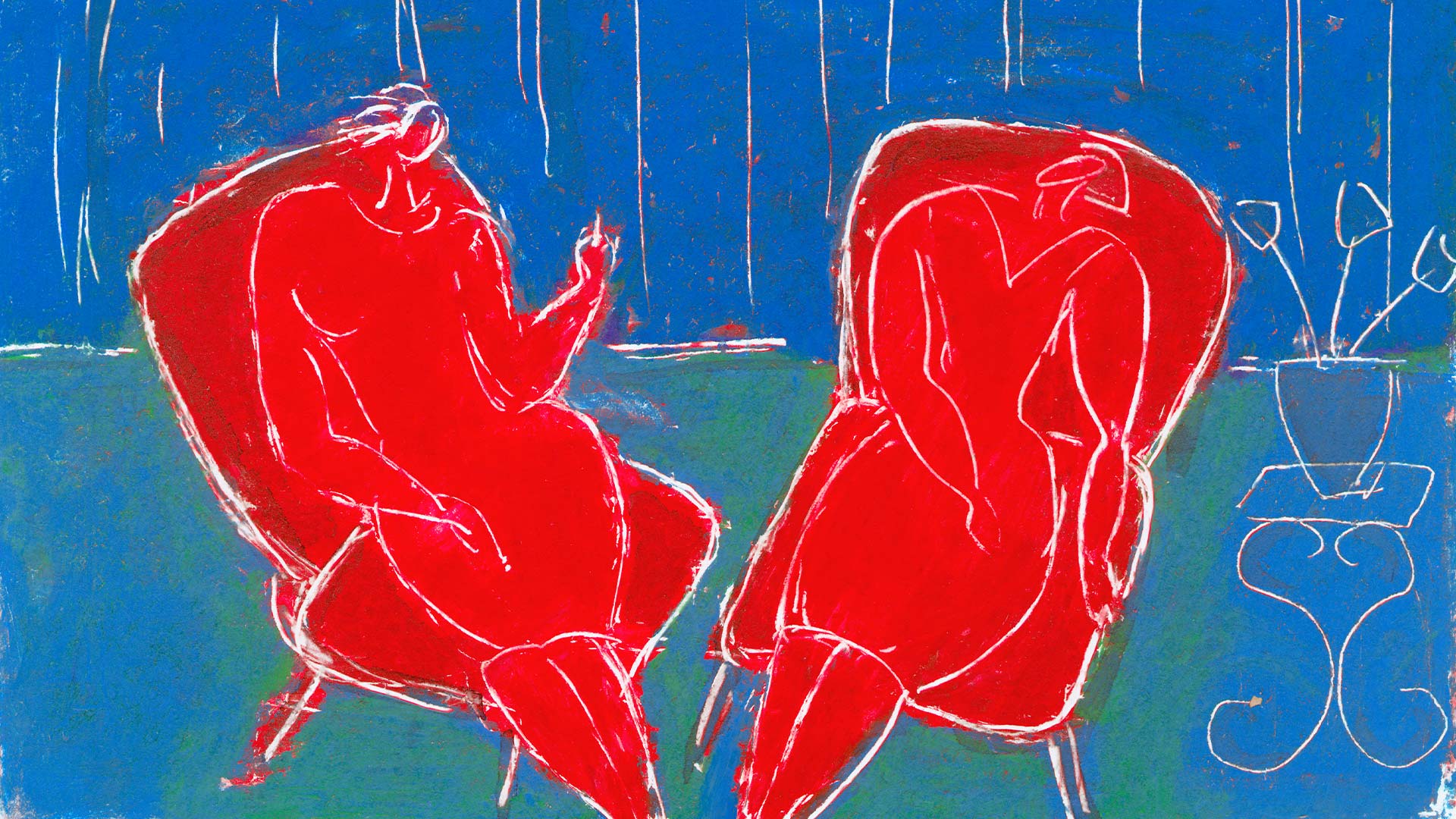‘I long for a work spouse. I think of cheap white wine, drunk while standing up among a throng of people’
It’s been a while since we've seen them. One writer reflects on the nostalgia she feels for her work spouse...


What's in a work spouse? The most important thing about a work spouse is that they see the world—and the workplace—in a similar way to you. From eye rolls across the desk to setting the world to rights at knocking off time, they get you through the days at work when you think you can't. Here, Lynn Enright reflects on the nostalgia she feels for hers.
Working from home—which so many of us are now encouraged to do—has its benefits. The lack of a commute, for example, or the ability to put on a wash in the middle of the day. But there are definite downsides, too, and chief among them is the lack of colleagues.
It can, of course, go either way with colleagues—they can be an undeniable aggravation or, when everything aligns just so, they are worth more than any perk even the most lavish employer could bestow upon you.
It’s hard to tell on your first day. You are too concerned with establishing where the loos are for it to be too much of a thing. By the end of your first week, it’s still unlikely to have clicked. However, by the end of your first month, there’s a strong likelihood that you’ll know. By the end of your first month in a new job, it should be clear where the loos are situated. It should be obvious whether your boss is actually nice or not, and it should be apparent who has become your best-friend-at-work or your “work spouse” or whatever you want to call it. Perhaps you’ll be unlucky and there is no one with whom you can exchange knowing glances, no one you can message about lunch options at 10.15am—but if there is, you’ve probably found them by now.
- Nostalgia 2000s: here's why that nostalgic TV binge (we're looking at you Gossip Girl and The O.C.) is actually good for you.
The most important thing about a work spouse is that they see the world—and the workplace—in a similar way to you
For most people who work in offices, it’s been quite a long time since they have seen their work spouse IRL. They’ve likely exchanged glances on Teams meetings and they’ve probably been furiously messaging each other—but they haven’t been able to vent to each other as they get lunch, they haven’t been able to offer hugs or cups of tea or go for walks around the block. They haven’t been able to process a particularly stressful week by going to the pub and polishing off a bottle of white wine by 6.30pm.
Work spouses are just another thing we have lost during the pandemic—and if adjustments to the way we work really are as permanent as people are saying they are, then the mechanics of the work marriage look set to change forever. It’s obviously not going to disappear completely —but the way we establish and maintain friendships is different in a predominantly online workplace.
- This is how friendships are changing because of the pandemic

A work spouse can be any gender and any sexual orientation. They can be any age, too, although it’s probably true to say that they’ll be roughly the same age as you. They don’t have to do the same job as you but they obviously have to work in the same organization and it helps if their desk is on the same floor. Best of all is when you can easily make eye contact. The most important thing about a work spouse is that they see the world—and the workplace—in a similar way to you. Yes, you can disagree about just how ludicrous the new plan for streamlining the workflow process is—but broadly, you two agree on the fundamental problems that exist within the organization. Look, it's not all negative, you can obviously agree on the fundamental benefits that exist within the organization, too, but they are less likely to encourage you to send urgent DMs or cryptic eyebrow messages.

- The pandemic is causing stress hair loss in young women
Work spouses are the ones who notice if you come back from a meeting with a splotchy stress rash and they are the ones who will help you interpret a passive-aggressive email from your boss. It’s perhaps no surprise that the most intense work friendships I have ever had were cultivated in the most dysfunctional workplaces I have ever worked at. When you’re battling bad bosses or systems that just don’t work, a work spouse can feel like the buffer between you and a sense of true doom.
Actual spouses or partners and IRL friends can sympathize with your work problems but they are unlikely to be as obsessed as a work spouse. For that reason, the work spouse can be a genuine boon to your career. By comparing notes on pay, or progress, you can each know what to aim for and ask for. You can use your work spouse as a sounding board, secure in the knowledge that they truly understand the organization that you work for as well as having your best interests at heart. They know the ins and outs of your career just as well as they know your vending machine order.
I long for a work spouse. I think of cheap white wine, drunk while standing up among a throng of people
Even before I packed up my box of belongings last year and left the office for what would be the final time, I had noticed that my work marriages were not as all-consuming as they had once been. I was working in an altogether more professional environment than I had been previously, which meant that I didn’t need a work spouse with quite the same intensity. As well as that, I was getting older and I usually didn’t make it to the pub on a Friday.
These days, though, when I close my laptop on a Friday evening, sitting alone at my kitchen table, I long for a work spouse. I think of cheap white wine, drunk while standing up among a throng of people. I think of us all chatting and gossiping and venting, supporting and bolstering and encouraging. I think of how one glance across a bank of desks or one “lol” that arrives in your inbox at just the right time can help to create a friendship that lives long beyond the job.
Lynn Enright is a journalist (Vogue, ES Mag, Grazia, Guardian, Irish Times) and author. Her first book, Vagina: A Re-Education, is out now in paperback.
